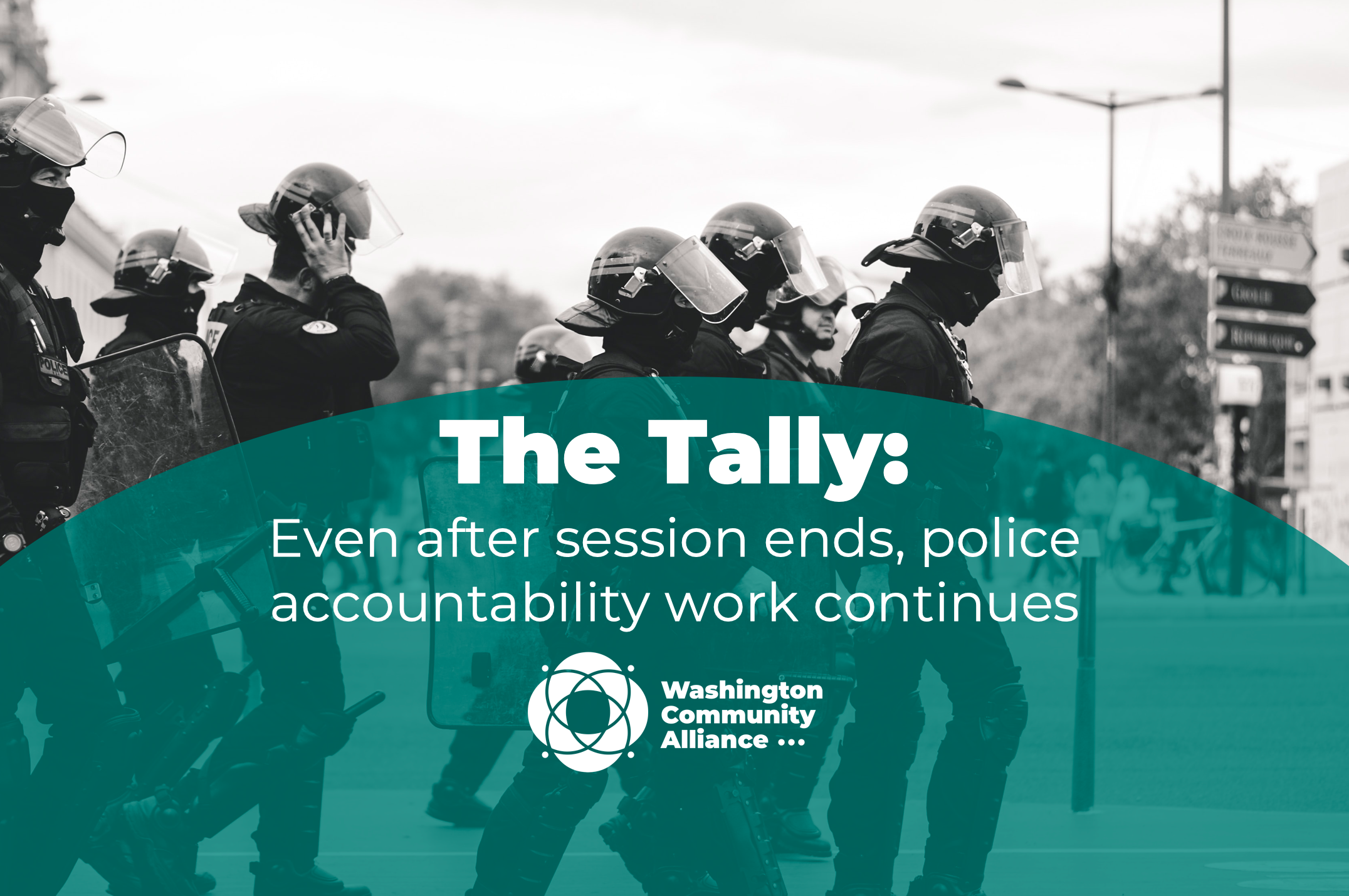
April saw a small measure of accountability as we watched George Floyd’s killer, Minneapolis officer Derek Chauvin, found guilty on all counts. It’s the result of a historic summer where more people than ever before took to the streets to demand justice—protests in Washington state alone spanned nearly every county. But just as we all took a collective sigh of relief, news broke of Ma’Khia Bryant, a 16 year old Black girl, being shot and killed by the Columbus police in Ohio. She was just 1 of 5 people killed by the police on the day of Chauvin’s verdict. Meanwhile, here in Washington State, we marked the 13th month of an investigation into the Tacoma Police department’s killing of Manuel Ellis.
All of this is a stark reminder that, while we made HUGE progress on police accountability in the Washington State legislature this year, the work is far from over.
Let’s talk about what legislators did and the limits of those bills:
How we got here:
At the start of session there were two categories of police accountability bills: 1) new rules and restrictions on police, and 2) accountability measures for when they break present restrictions or new rules. A lot was done on the first, but not on the latter because, unsurprisingly, police unions went all out to undermine our legislative efforts.
Good, not great.
Pushed by a roster of Black first-term legislators, the legislature passed more police accountability measures this session than in recent memory. They did a lot, but they also made compromises we disagree with:
- Passed a Decertification Bill (SSB 5051) that empowers a statewide board to decertify officers for bad behavior, but failed to pass HB1203 which would have created police oversight boards exclusive led by community to investigate their local departments
- Passed HB 1267 mandating independent investigations when officers kill someone, but failed to pass HB 1507, a priority of impacted families, that would allow independent investigations for all uses of force, not just when the victim is killed
- Passed HB 1054 regulating police tactics, HB 1310 limiting use of force, SB5066 creating a duty to intervene, and SB5259 requiring reporting on use of force, but failed to pass HB1202 which would have ended qualified immunity and allowed victims and their families to hold police officers accountable in court, just like anyone else who breaks the law
A note on community oversight boards.
If you remember, this was one of Our Big Five because they’re the key to unlocking all the other problems. At the core of police abuse is a dramatic power imbalance that allows officers to be judge, jury, and executioner. Giving community members the power to directly investigate law enforcements begins to put individual and broader decisions around public safety back into the hands of the people. After making our bill made it out of the bi-partisan rules committee, advocates were told by the majority there wasn’t support within the caucus for giving that power to community, which is code for the cop lobby won.
Don’t stop learning.
Legislative session happens once a year, but the work continues. Understand the full extend of the problem in our state.
- Read and share Crosscut’s reporting that found nearly 200 officers in WA can’t be trusted in court and this article explaining how bad cops who get fired use arbitration to get re-hired
- Find which of the 6 most common police union contract loopholes are in your city and demand better: Yakima, Tacoma, Seattle, Spokane, Kent, Vancouver, Auburn, Wenatchee, Bellevue, Bellingham, Bothell, Bremerton, Des Moines, Kennewick, Lacey, Lakewood, Lynwood, Puyallup, Redmond, Walla Walla
Take the fight to the local level.
The legislature responds to what cities and counties do. Between now and January of next year, push your city and county electeds and candidates on the following issues:
- Divert 911 calls that don’t need armed police like Denver, CO has done. (Crisis response programs like LEAD in Seattle or CRU in Olympia seem promising and should expand)
- Take armed police out of traffic stops like Berkley, CA (see this NYT piece on how it’s going)
- Create an all-civilian, community-led oversight structure with real power to investigate and discipline their police department like
- Don’t negotiate accountability in police union contracts
Follow Washington For Black Lives for more information on how to stay engaged.
What do you think? Have any questions? Tweet us your thoughts @wacommalliance. Keep up with the action and opportunities to get involved with our legislative newsletter The Tally.

